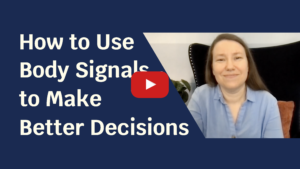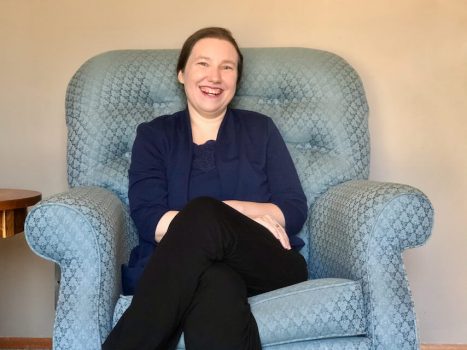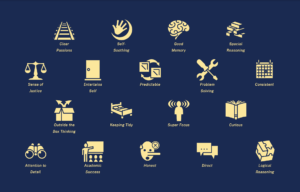

How to Use Body Signals to Make Better Decisions
If decision making is hard for you, here’s a technique to use body sensations as another source of information for decision making.
As Albert Einstein said,
“We cannot solve our problems with the same thinking we used when we created them.”In other words, radically different results require a radically different approach.

When I got my autism diagnosis (at age 35) and started trying to figure this stuff out, I scoured the Internet, researched standard “treatment” options, and searched high and low for anything that would help. I was quickly frustrated that most autism services were only available to kids, but later learned that most of those were crap anyway. So, blessing in disguise.
That forced me to look for unorthodox solutions. To find my own way. And confront a lot of my assumptions, internalized ableism, and prejudice against using my emotions or body signals as any sort of useful information.
These paradigm shifts sparked a new special interest: understanding the psychology-biology-neuroscience of what worked for me, and why.
It also let me let go of the crap we learn in society about “letting things go” (ironic, right?), and other inane precepts.
So, I won’t try to logic you out of your anxieties, explain why they don’t make sense, or tell you to “get over it.”
I also won’t try exposure techniques, compulsion, accountability to arbitrary goals, or anything that you let me know is personally triggering.
That means: I don’t take an ordinary approach. It’s mind-body-emotions integrative. I talk about the nervous system a lot. It’s customized for how our autistic and neurowonderful mindbodies work and perceive the world, and tailored to your unique mindbody.

My personal approach is heavily influenced by:
I also incorporate principles from: sensory integration, interoception, embodiment, mindfulness, Steven Hayes’ Acceptance and Commitment Therapy (ACT), The Empowerment Dynamic of David Emerald, The Four Agreements of Don Miguel Ruiz, Alfie Kohn’s work on intrinsic motivation, Marshall Rosenberg’s Nonviolent Communication, the Emotional Freedom Technique (tapping), and more.
A complete mind-body-emotions fusion that’s based on what has worked for me and my clients.
Most importantly, I don’t want your compliance.
I help neurodivergent people, mostly Autistics, to learn and internalize the things we should have been taught growing up, like:
Sound intriguing?
Here’s a short description of the type of coaching I do and how sessions work.
First of all, you’re welcome to move, stimm, fidget, tic, doodle, or look away during our time together, and to have your camera on or off as you choose.



You can come to a session without a specific agenda, and I’ll help you find a place to start, or you can bring a particular issue that you’re struggling with.
From there I’ll ask questions to help you figure out what’s going on under the surface, to find the things that you’ve been taught to believe about yourself and the world that have been hurting you and holding you back.
We will gently and compassionately question them to find out which ones are really true and which are social conditioning or protective mechanisms that you don’t need anymore.
As you unlearn each ableist belief, each bit of conditioning from your family, teachers, society, etc., new options will emerge for addressing that specific issue, freeing up energy and mental processing that had been stuck. Often this creates ripples that will spread throughout your life to help in other areas as well.
Depending on the situation, and with your permission, I may share some very practical strategies and techniques, however I won’t ever tell you “what to do.” Rather, I’ll be sharing a framework that you can adapt to your own personality, needs, and circumstances.
This is the process of making your whole life better, one little bit at a time.
Again, I can help by asking powerful questions, and offer some strategies and tools, but the power of it all is that I help you figure out for yourself what works best for you.


You probably won’t completely unmask, be all done with burnout, or cheerfully chit-chat with strangers. It’s too soon for that. Waaay too soon.
You’ll probably will feel more openness inside, making it easier to get through the day and face the ordinary things you have to do. And you’ll probably begin to imagine that things could get even better.
When you’re trying to make a decision, I can help you process your thoughts, feelings, and reactions, and stimulate self-reflection. I have tools and techniques that can help you deal with the anxiety of uncertainty, or of what might happen, and try other ways to make decisions. I’ll ask questions that help you consider options in a new way, or generate new options.
But I won’t decide for you. And I won’t push you into a decision.
Because what I think would be best may not be what would work best for you. My perspective is not your perspective. And you’re the one who is going to have to live with the decision. So I won’t tell you what to do or decide for you.
I fundamentally believe that you know what is best for you, even if you don’t have access to that information right now. What I help you do is access and use that information well.
Ummm…I don’t like goals. (Well, sort of.)
I don’t engage in the kind of goal setting and accountability that further the coercive systems and mentality of our society that I want to break away from.
If you have goals that you would like to work on, I can help support you do to do that, but I’m not going to create them for you and I’m not going to get on your case about why you didn’t do it or why you chose to do something else.
But a lot of what I do is exploring with you, as an equal partner, the things in your life that you’re trying to make better. To look really deeply at what’s getting in the way of what you want—what about the current situation is not working for you—without comparison or judgment.
Again, I can’t, and won’t try to, “make” you do anything. You are in charge of yourself.
And to answer your question, it depends on what you want.
For many of my clients, “homework,” or “assignments” tend to create more stress than positive outcomes.
If you’re reflective between sessions, and feel inspired to something personal-growth-ish, that’s great. If you don’t, that’s great, too. Sometimes not doing is exactly what you need.
Part of our work together is in dismantling the oppressive “shoulds” that we’ve been conditioned to believe are the only way to get anywhere in life (but have they been working for you so far?).
You know deep down what works for you and what doesn’t, and it’s my job to help you get in touch with your own inner wisdom and trust yourself.
To put that another way, I’m not in charge of you; I’m here to support you as you direct your own progress.
For some of my clients, they thrive on having some structure or goals in between sessions so it doesn’t turn into an hour of growth that falls into a memory void.
If we get to the the end of a session and you want something practical that will naturally continue the progress we have made together, I can offer a suggestion and we can tweak it together so it is what you want to do and feels do-able on your terms.
The one-size-fits-all-model doesn’t even work for t-shirts, never mind the complexities of human—especially neurodivergent—experience. And many of us have other intersecting, marginalized identities that inform what we need.
Even if we started by planning out everything in advance, tailored for you, you would discover new things about yourself each time, so the original plan would quickly become irrelevant and create stress.
So everything is customized to you. There is enough predictability in how sessions work to reduce stress, and you get to choose the topics (I can help if you want), but our sessions will evolve naturally from one to the next.
I care deeply about consent, partnership, and empowering your personal sovereignty.
I won’t always know that a topic will be tender, so when I do misstep, I hope you will be able to say something like, “I don’t want to go there,” and I will say “Okay, thank you for telling me that,” and move on, no questions asked.
For some people, speaking up for yourself is hard. Really hard. (I’ve been there.) This can be a chance to try it without shame or pushback or any negative repercussions.
Fortunately, this isn’t therapy, and I am not a trained therapist. We may gently, briefly, recognize that there is a history that caused some old wounds, because pretending that anxieties exist without a cause won’t give you the results you’re looking for.
But we won’t linger there or unpack all of the parts of it the way a good therapist would. (By the way, depending on your situation, it can be very helpful during this process to work with a therapist who is a good fit for you.)
What we will do together is something closer to recognizing that, for example, a girl made fun of you when you were five and that was painful, and you told yourself that she made fun of you because you weren’t OK the way you were, and that painful thought became deeply rooted. We’ll look at that thought and how it affected you, not so much the original experience.
I have a great deal of cognitive empathy, but I don’t absorb other people’s emotions the way some people do, and I don’t generally get overwhelmed by hearing about abuse or trauma, especially when it is in the past.
When I hear about injustices in the present, I want to do something about them, but that’s a different thing.
Therapy or counseling is best suited to working through issues from your past, including traumas and the psychological results of years of autistic gaslighting, etc.
Life coaching, at least the way I do it, takes those into account and treats them with compassion and care, but doesn’t get deeply into them. It focuses rather on making a better present and future for yourself.
To put it another way, therapy is like medicine for your mental health. Coaching is like vitamins and yoga, for when your mental health is reasonably stable and you want to make improvements to your life.
Some of my clients find it helpful to engage with both.
If you’re seriously considering doing this, that tells me you’re seriously interested, but it still might be scary. Here’s the thing. There are two kinds of scary: panic-scary and exciting-scary.
If you think about doing this and your gut clenches or your chest tightens and your shoulders, jaw, hands, or toes clench up and it gets hard to breathe, that’s panic-scary, and that’s your body telling you that this is not the right choice for you, or not the right time.
But if you think about doing this and your gut gets fluttery and your heart starts racing and you’re starting to think about things that you could do if this were to work, you’re probably experiencing exciting-scary. That’s the kind where taking the leap will probably work out well.
If you’ve tried everything (else), that tells me you really, really want a better life. It also tells me that those other things didn’t really get to the root of what’s been holding you back, which is the focus of my work.
Trying to work toward goals without removing the barriers that get in their way is like trying to push a car up a hill with the brakes on. It’s so much easier to take off the brakes, turn on the car, and drive up.
I’ll be up front with you. This work can be uncomfortable sometimes, because it means bringing up some things you don’t like to think about (for very good reasons). But I’ll be with you every step of the way, and will never push too hard. We’ll keep it gentle, and safe, and I will listen to you the whole way through.
If you’re ready to do this work (with support) it can be powerfully transformative.
All sessions are remote, via Zoom or over the phone, so it doesn’t matter where in the world you are.
Sessions are scheduled for 60 mins, but we’ll finish when it feels complete, which may be a few minutes more or less.
Most people get the best, most lasting results when we meet regularly, especially at the beginning to get some momentum going.
Twice a month is most common, or sometimes weekly or monthly.
Some people prefer an occasional session when something comes up they want to work through.
That works especially well after they’ve been doing this with me for a while and are getting better at continuing it themselves.
It’s really up to you and what you find works best. I don’t require any commitment, so you can modify the pace at any time, as often as needed.
Don’t worry, this won’t be another big thing for you to do.
And since I don’t give homework (unless you specifically ask for it), you don’t have to fret about that for days. 😉
It’s useful to have some idea of what you want to talk about, or get out of the session, but if you’re not sure, I can help and we always come up with something worth getting into (usually pretty easily).
If you want to prepare more for sessions, try asking yourself what you want to be different at the end of our time together. It may be understanding something, a new perspective, figuring out what’s really going on underneath a particular situation, why you’re reacting a certain way, or what’s holding you back from something.
If money is tight, or stuff on your calendar produces anxiety, or you don’t want to agree to too much, it might be easier to manage one at a time.
If executive functioning is a scarcer resource, the package might be easier, as you only have to checkout once. You can even schedule all six right then (but you don’t have to).
Nope.
You can try just one session, or a few, and stop anytime. If this is not a good fit for you, or you got great results in a few sessions (great!) and are happy to move on, that’s fine.
I don’t make contracts, or require commitments, or hold anyone to promises.
I do require payment upfront for any sessions you schedule (invoicing is a nightmare), but you never have to schedule more than you want, and can reschedule if needed.
Kindness.
Life comes up and sometimes you can’t make it.
You can reschedule or cancel up to two hours before a session and use that appointment later.
No-shows or cancellations with less than 2 hours notice are not refunded or rescheduled, as I don’t have the opportunity to re-plan my time.
If this happens once in a great while, no worries, that’s life.
If this happens more often, we’ll talk (non-judgmentally) about why. Maybe something is getting in the way, stressing you out, or executive function is interfering. If you want to continue, we might do some coaching if you’re not sure what’s going on, or talk about strategies to help.
Absolutely. Some of my clients identify as:
You’re not the only one. I offer professional consultations for therapists, counselors, educators, and other professionals who want to get better at creating positive working relationships with their Autistic clients.
Click here for more info.


If decision making is hard for you, here’s a technique to use body sensations as another source of information for decision making.


Social situations are complicated and difficult. I’d like to talk a bit about the pain and shame around them.


Autism isn’t just challenges. There are some wonderful strengths and attributes as well.
We don’t spam or sell. Promise. Unsubscribe at any time.
Read our privacy policy here.
The information on this site is not intended or implied to be a substitute for psychotherapy, medical advice, diagnosis, or treatment.
© 2020-2024 Autism Chrysalis LLC.